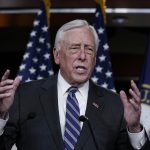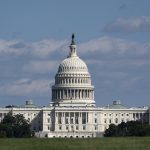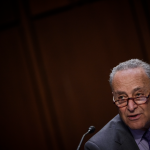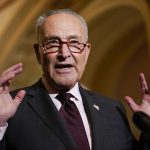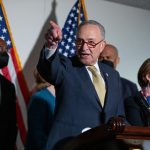The Jan. 6 committee has dropped a stick of political dynamite by outlining a criminal case against former President Donald Trump, but the Justice Department decides whether to light the fuse. And Democrats are starting to nudge.
In a blockbuster Wednesday night court filing, congressional investigators said there’s a strong case the former president committed felony obstruction when he tried to overturn the election, among other potential charges. Jan. 6 panel members, however, say DOJ shouldn’t wait for them — importantly, it could be months before they make the call on any related formal criminal referrals.
And progressives are starting to ramp up pressure on DOJ to investigate.
“The evidence is mounting that there was a concerted effort to overturn the results of the election in so many different ways. And there’s, in my view, a lot of information that President Trump knew about it — and more,” Sen. Mazie Hirono (D-Hawaii) said Thursday.
Until now, Washington has viewed the decision on a criminal referral against Trump as a major pivot point in the Jan. 6 probe. But select panel members are now saying there may not be a need for one, given how much detail they’ve outlined in the public record so far. Which leaves the onus increasingly on Attorney General Merrick Garland, as Democrats worry about their own foothold in Congress and Trump openly weighs another run in 2024.
Rep. Adam Schiff (D-Calif.), a member of the select panel, said he’s concerned that DOJ has not yet taken potential crimes by Trump and his network seriously enough. The lack of overt signs that Trump is being investigated suggests that the department has not yet moved, he observed.
“If the Justice Department believes there is evidence of a crime involving anyone, including the former president, they should be investigating it,” Schiff said.
He’s airing a pervasive Democratic fear: if DOJ doesn’t act against Trump, there will ultimately be no consequences for a scheme that threatened the peaceful transfer of power. While the former president is facing a separate investigation by New York’s attorney general into his finances and a county prosecutor probing his pressure on Georgia secretary of state Brad Raffensperger to pursue baseless claims of voter fraud, a federal Jan. 6-related investigation touching Trump would be a national conflagration.
It’s a fire that some senior Democrats aren’t quite clamoring to stoke.
“I’m not worried about that,” Senate Judiciary Chair Dick Durbin (D-Ill.) said when asked if the Jan. 6 panel’s finding should speed up Garland’s pace. “I don’t know where [DOJ is]. I haven’t asked them, officially or unofficially.”
Rep. Bennie Thompson (D-Miss.), the select committee’s chair, took a similar hands-off approach.
“At the end of the day, we’re not a criminal entity, so we can only say what we found and we believe,” Thompson said. “And obviously, if another agency wants to take it up based on that evidence, it’s up to them.”
Whether DOJ is investigating potential crimes by Trump or his inner circle has remained an elusive and consequential question. The Justice Department has arrested and charged nearly 800 people who joined the mob attack on the Capitol, alleging crimes ranging from simple trespassing to seditious conspiracy, police assault and obstruction — the same crime the select committee says Trump may have committed.
But there are some indications that DOJ’s Jan. 6 investigation, which it describes as the most complex in U.S. history, has brushed up against Trump-world. For example, several members of the Oath Keepers charged with breaching the Capitol also served on a security detail for Trump ally Roger Stone. Prosecutors have also been investigating a group run by Trump ally Sidney Powell, an attorney who encouraged Trump to seize voting machines in service of his bid to reverse the election.
In November, the department indicted former Trump adviser Steve Bannon for contempt of Congress after he failed to comply with a subpoena from the select committee. The panel also referred Trump’s former chief of staff Mark Meadows for contempt prosecution in December, but it’s unclear whether DOJ is investigating the matter.
Other Democrats in the House and Senate were emboldened by Tuesday’s voluminous release of evidence by the select committee, saying it created a moral imperative for DOJ to take action.
“Criminal prosecutions are appropriate. No question,” said Rep. David Cicilline (D-R.I.), who served as a manager during Trump’s second impeachment trial for the Jan. 6 insurrection, though he emphasized the independence of the department.
“My reaction? What took you so long?” said Rep. Gerry Connolly (D-Va.) of the conclusion that Trump likely violated the law. “Donald Trump needs to be held accountable for what appear to be crimes.”
Hirono, a Judiciary Committee member, said she wanted the Justice Department to take action, and if it were referred to the department, they need to “decide one way or the other whether they’re going to investigate or whatever they’re going to do.”
Though much of the attention on the select committee in recent months has centered on whether they will formally refer Trump or others in his orbit for criminal prosecution, committee members made clear their decision is more symbolic than substantive.
“The Justice Department doesn’t have a requirement to wait for Congress. Historically, it doesn’t wait for Congress and I don’t think it should wait for Congress here,” Schiff said.
He added that a criminal referral could even backfire. “Congress has to be careful not to play into any narrative that a prosecution that the Justice Department would bring is politically motivated,” he said.
Other panel members emphasized that their goal was not to make criminal recommendations anyway, but rather to propose policies intended to prevent future abuses of the electoral process and close loopholes that allowed Trump to perpetuate false claims that he could reverse the election results on Jan. 6.
“It’s not the purpose of our committee to pursue criminal acts,” said Rep. Elaine Luria (D-Va.), a select committee member. “As we’ve said, if something comes to our attention, we’ll refer that information to the Department of Justice appropriately.”
Marianne LeVine and Burgess Everett contributed to this report


